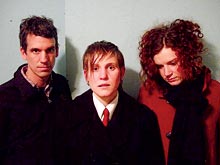Sometime in early 2002, Sarah Brown returned to her Portland, Ore., home to discover that her dear friend and band mate Tasha Trasher had traded in her gigantically booming bass amp for an accordion. At the time, the two of them comprised two thirds of Heart Beats Red, a noisy Pacific Northwestern indie rock outfit. At the time it may have seemed like a strange swap, but, looking back, this would be the duo’s first step on a new musicial journey.

That spring, Brown and Trasher hit the road in search of new territory and dryer climes. After much deliberation and a number of cross-country payphone conversations, they decided to meet up with childhood friend Todd Weakley in the mountains of Western North Carolina.
The three of them weren’t just old friends—they were also, as Brown puts it, “big fans for each other’s songs.” A possible, if potentially short-lived, collaboration seemed to be in the works.
“We’d wanted to play together for a while but had always been too far apart,” recalls Brown. This new move would enable the inception of a project that had been the subject of many “one-day-we-have-to” type discussions for years.
Thus, Hope and Anchor was born.
The idea behind the band was to create a musical entity that could essentially bring the listener into the trio’s late-night, living-room practice sessions. Stripping away the noise and distortion that had defined most of their earlier music, the three sought to forge a new sound. That sound, as they saw it, should be simple, intimate, and—most of all—every song should feel as if it were a solo performance by the member who wrote it, backed by friends who care almost as much about the song as the creator.
In a move that often baffles some showgoers, the trio rarely, if ever, performs with electronic amplification. That means no microphones, no amps and no speakers. It may seem like a drastic step, given how raucous many nightclub crowds tend to be, but there’s a reason behind it. By cutting out the gear, and by forcing the audience to actively listen to the songs, Hope and Anchor remove some of the distance between the performer and listener.
It has been more than half a decade since the first Hope and Anchor performance, and in that time the band has found itself stitched into the piecemeal quilt that makes up Asheville’s music scene. They’ve become such a musical mainstay that they’re almost taken for granted.
This unapologetically sentimental band somehow manages to seem sincere without being sappy, and emotionally raw without seeming precious. There’s a delicate balance at work, one that seems to reconcile a group that is as comfortable with a fragile melody as the band members are with their punk-rock past. (Maybe it’s not entirely in the past. “I still refuse to say that Heart Beats Red is over,” admits Brown. “One day we’ll do another tour, I just know it.”)
But, how does an intensely intimate trio share the stage with their louder colleagues? They ask the crowds to settle down and listen. It may come as a shock to some who view the punk-music scene (which has been significantly supportive of Hope and Anchor over the years) as a collection of eardrum-damaged thrashers, but their audiences don’t seem to mind.
Hope and Anchor’s last album, 2006’s The Wait and Wonder, was released by the D.C.-based punk/hardcore label Exotic Fever Records. The same album was picked up for distribution by none other than Dischord, the label behind iconic punk groups like Minor Threat and Fugazi.
Currently, Hope and Anchor is in the process of recording a new album, which is receiving a boost on the production side by local favorite and rising folk-rock star Tyler Ramsey. A frequent collaborator with the band, Ramsey even picked the trio to open at his high-profile CD-release party earlier this year.
“We love working with Tyler,” Brown says. “He played on several of the songs on The Wait and Wonder. We pretty much gave him free rein to pick a song and do whatever he wanted.”
What does the future hold for Hope and Anchor?
With Trasher recently returned from Europe, where she toured with the current lineup of the Durham-based band Des Ark, the three are preparing for a string of shows in the months ahead. This week, they’ll be opening for the Milwaukee-based Americana group The Championship.
When asked about performing with that band, Brown can’t help but exude pure enthusiasm. “They’re great friends of ours,” she says. “We play with them every time they come around.”
It’s telling that nearly every artist who shares the stage with Hope and Anchor seems to end up becoming—genuinely and affectionately—referred to as a “great friend.” Bands like Hope and Anchor, driven as they are by an honest desire for collaboration and sharing, are one of the acts that define the best—the beating red heart—of the local music scene.
[David Cole is a freelance writer based in Asheville.]
who: Hope and Anchor with The Championship
what: Emotional, intimate post-punk
where: Grey Eagle
when: Saturday, March 8. 9 p.m. ($8. www.thegreyeagle.com or 232-5800)



One of my favorite bands in Asheville. Inspired performers and writers, personally gracious, and champions of the local music scene.